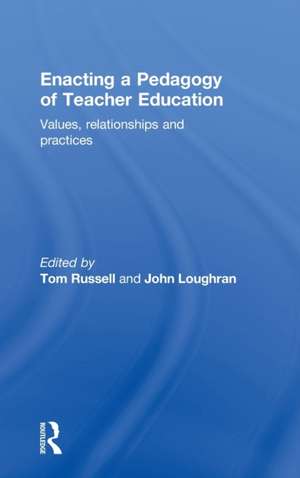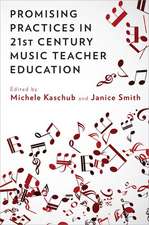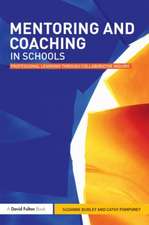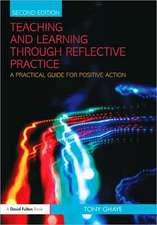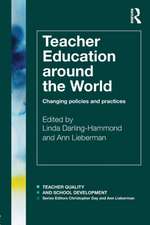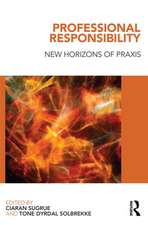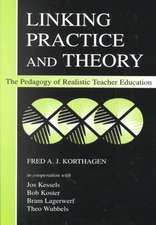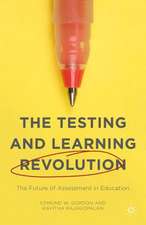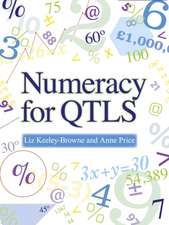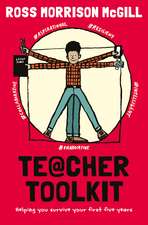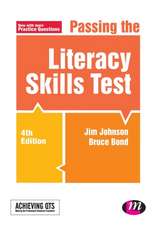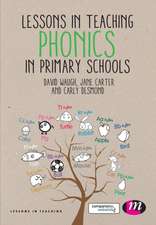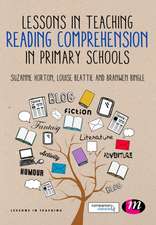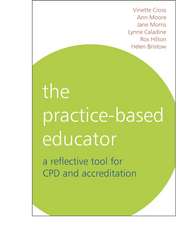Enacting a Pedagogy of Teacher Education: Values, Relationships and Practices
Editat de Tom Russell, John Loughranen Limba Engleză Hardback – 20 feb 2007
Bringing together contributions from internationally known teacher educators, a school administrator who supports teachers’ professional learning, someone studying to become a teacher educator and someone studying to become a teacher, the book examines enacting educational and pedagogical values in personal practice and developing the interpersonal relationships that are so essential to quality teaching and learning.
Each chapter illustrates an individual working to better understand the processes of teaching and learning and then modifying personal practices to enact a productive pedagogy of teacher education. This collection extends the rich literature emerging from the field while also focusing explicit attention on the challenges of enacting a pedagogy of teacher education.
| Toate formatele și edițiile | Preț | Express |
|---|---|---|
| Paperback (1) | 439.41 lei 6-8 săpt. | |
| Taylor & Francis – 15 mar 2007 | 439.41 lei 6-8 săpt. | |
| Hardback (1) | 1221.12 lei 6-8 săpt. | |
| Taylor & Francis – 20 feb 2007 | 1221.12 lei 6-8 săpt. |
Preț: 1221.12 lei
Preț vechi: 1489.17 lei
-18% Nou
Puncte Express: 1832
Preț estimativ în valută:
233.69€ • 243.08$ • 192.93£
233.69€ • 243.08$ • 192.93£
Carte tipărită la comandă
Livrare economică 14-28 aprilie
Preluare comenzi: 021 569.72.76
Specificații
ISBN-13: 9780415418997
ISBN-10: 0415418992
Pagini: 208
Ilustrații: 3 tables and 4 line drawings
Dimensiuni: 156 x 234 mm
Greutate: 0.54 kg
Ediția:New.
Editura: Taylor & Francis
Colecția Routledge
Locul publicării:Oxford, United Kingdom
ISBN-10: 0415418992
Pagini: 208
Ilustrații: 3 tables and 4 line drawings
Dimensiuni: 156 x 234 mm
Greutate: 0.54 kg
Ediția:New.
Editura: Taylor & Francis
Colecția Routledge
Locul publicării:Oxford, United Kingdom
Public țintă
Postgraduate and ProfessionalCuprins
1. Providing the Necessary Luxuries for Teacher Reflection 2. Do You Encounter your Students or Yourself?—Inspiration as an Essential Component of Teacher 3. Education 4. Sitting on the Fence: The Student Teacher’s Relationship with Associate Teachers as both Peer and Student 5. Weaving Inquiry, Theory and Reflection into the Teaching of Teachers 6. Reconceptualizing Practice for Equity and Inclusion: Learning from Program Restructuring 7. Grounding Secondary Teacher Education in Social Justice 8. Finding my Way from Teacher to Teacher Educator: Valuing Innovative Pedagogy and Inquiry into Practice 9. Constructing and Reconstructing the Concepts of Development and Learning: The Central Nature of Theory in my own Practice 10. How Practice Changed my Values as a Teacher Educator 11. Developing Professional Knowledge through Critical Friendship 12. Preparing Student Teachers for Value Development and Personal Growth in Children: The Role of Knowledge, Language and Golden Moments 13. Enacting a Pedagogy of Teacher Education
Recenzii
Review 1 Gaelen Erickson, University of British Columbia, Canda
The editors are arguing that this edited book would form a companion volume for the text by John Loughran, Developing a Pedagogy of Teacher Education, recently published by Routledge. As such one can envisage a similar significant market for this complementary book and I would suggest that Routledge should market it as such. The strength of this proposal is that it offers to present a variety of case studies that are intended to illustrate some of the assertions and principles of teaching practice that Loughran develops in his text.
The subject-matter of this book, the pedagogy of teacher education, is certainly germane to teacher educators in all of the above countries and beyond. The proposed book is strongly influenced by the emergent field of the ‘self-study of teacher education’ and as such would be of interest to a significant number of faculty members and other educators involved with the preparation of teachers. Furthermore, the book could be used in a variety of graduate level courses aimed at preparing prospective teacher educators. In other words, there is a sizeable market for a book of this nature.
The primary student market would likely be graduate students involved in preparing to be teacher educators or studying teacher education. Because of the great diversity of graduate programs in all of the Countries listed above, plus those in smaller markets like Australia and Canada, it is not possible to list courses or decide whether instructors would choose to use it as a primary text. As I suggested above, Routledge could decide to market it as a companion text to Loughran’s text.
The field of teacher education is an emerging field of study and inquiry and the number of books in this field is steadily growing. The editors of this volume have indeed contributed a number of these texts, many of which have been published by Routledge and Falmer.
I would think that these two books would remain current for around 8 to 10 years as the field of research in teacher education is coming into its own and the sub-specialty of the ‘self-study’ of teacher education continues to gain momentum in terms of creating a recent Handbook and a new journal.
Both of the editors in this proposed volume are indeed leading authorities in the field and as I’ve indicated earlier, have already contributed several edited and single authored books in the field. They are both very active researchers and will be recognised by most researchers in the field of teacher education. Furthermore, there are an interesting diversity of contributing authors for each of the chapters coming from a diversity of backgrounds and perspectives. This can be a strength as long as there are some explicit conceptual strands holding the chapters together.
Yes, I think that this book would be worth publishing and it should serve to enhance both texts.
Review 2
Review 2 Professor Morwenna Griffiths, Nottingham Trent University, UK
This book should sell well. It will sell to teacher educators in the English-speaking world, and, though probably less so because of language, in mainland Europe. Teacher educators in all these areas find themselves subject to an unprecedented level of managerialism and control, as they struggle to hold onto the educational and pedagogical values that brought them into teaching. New teacher educators are also required to learn how to teach in universities in a culture of managerialism and performativity which increases their felt tensions in relation to their jobs. There is very little time for them to reflect, let alone discuss and resolve these tensions with their colleagues. A book such as the one proposed will allow them to join a kind of 'invisible college ' which recognises these tensions and suggests possible resolutions. Moreover it does so by recounting personal stories. These are much easier to relate to, especially at the end of a long day, than are dry, academic abstractions. In any case there is evidence that such personal stories are one of the preferred modes of professional development for teachers and teacher educators. Such stories are illuminative rather than dogmatic, acknowledging as they do, that pedagogy is always context-dependent and deeply personal. Teacher education and its pedagogy are a favoured subject for research in many universities in Britain, North America, Australia and New Zealand. The book such as this one would be needed by such researchers, putting forward as it does, a coherent framework of theory and research.
The book is only partially intended for the student market. I understand that in other English-speaking countries there are courses for new teacher educators. If this is the case this book would be essential reading. However it is not the case in any of the institutions of higher education with which I'm familiar in the UK. Therefore, the book would need to be priced so that somebody might think it was worth buying because they would want to read it, rather than because it was on a course list where it might make a difference to an assessment: i.e. the price should not be set prohibitively high. I think it unlikely that the book will go quickly out of date. It is not focused on any particular initiative in teacher education, or on any special policies. Rather, it explores ways in which teacher educators can realise their pedagogical values in differing contexts -- some hostile, some supportive. This is a perennial dilemma, not one that will disappear any time soon.
I agree with the authors that there are no competitive books available. I certainly cannot think of any, nor did a quick search turn up any. In relation to self-study, the field is small but enthusiastic so extra books support each other rather than being in competition with each other. In relation to teacher educators, there are in any case very few books, and none of them are quite like this one.
The authors are well-known in the field and beyond, as are many of the contributors. I think you should publish the book.
The editors are arguing that this edited book would form a companion volume for the text by John Loughran, Developing a Pedagogy of Teacher Education, recently published by Routledge. As such one can envisage a similar significant market for this complementary book and I would suggest that Routledge should market it as such. The strength of this proposal is that it offers to present a variety of case studies that are intended to illustrate some of the assertions and principles of teaching practice that Loughran develops in his text.
The subject-matter of this book, the pedagogy of teacher education, is certainly germane to teacher educators in all of the above countries and beyond. The proposed book is strongly influenced by the emergent field of the ‘self-study of teacher education’ and as such would be of interest to a significant number of faculty members and other educators involved with the preparation of teachers. Furthermore, the book could be used in a variety of graduate level courses aimed at preparing prospective teacher educators. In other words, there is a sizeable market for a book of this nature.
The primary student market would likely be graduate students involved in preparing to be teacher educators or studying teacher education. Because of the great diversity of graduate programs in all of the Countries listed above, plus those in smaller markets like Australia and Canada, it is not possible to list courses or decide whether instructors would choose to use it as a primary text. As I suggested above, Routledge could decide to market it as a companion text to Loughran’s text.
The field of teacher education is an emerging field of study and inquiry and the number of books in this field is steadily growing. The editors of this volume have indeed contributed a number of these texts, many of which have been published by Routledge and Falmer.
I would think that these two books would remain current for around 8 to 10 years as the field of research in teacher education is coming into its own and the sub-specialty of the ‘self-study’ of teacher education continues to gain momentum in terms of creating a recent Handbook and a new journal.
Both of the editors in this proposed volume are indeed leading authorities in the field and as I’ve indicated earlier, have already contributed several edited and single authored books in the field. They are both very active researchers and will be recognised by most researchers in the field of teacher education. Furthermore, there are an interesting diversity of contributing authors for each of the chapters coming from a diversity of backgrounds and perspectives. This can be a strength as long as there are some explicit conceptual strands holding the chapters together.
Yes, I think that this book would be worth publishing and it should serve to enhance both texts.
Review 2
Review 2 Professor Morwenna Griffiths, Nottingham Trent University, UK
This book should sell well. It will sell to teacher educators in the English-speaking world, and, though probably less so because of language, in mainland Europe. Teacher educators in all these areas find themselves subject to an unprecedented level of managerialism and control, as they struggle to hold onto the educational and pedagogical values that brought them into teaching. New teacher educators are also required to learn how to teach in universities in a culture of managerialism and performativity which increases their felt tensions in relation to their jobs. There is very little time for them to reflect, let alone discuss and resolve these tensions with their colleagues. A book such as the one proposed will allow them to join a kind of 'invisible college ' which recognises these tensions and suggests possible resolutions. Moreover it does so by recounting personal stories. These are much easier to relate to, especially at the end of a long day, than are dry, academic abstractions. In any case there is evidence that such personal stories are one of the preferred modes of professional development for teachers and teacher educators. Such stories are illuminative rather than dogmatic, acknowledging as they do, that pedagogy is always context-dependent and deeply personal. Teacher education and its pedagogy are a favoured subject for research in many universities in Britain, North America, Australia and New Zealand. The book such as this one would be needed by such researchers, putting forward as it does, a coherent framework of theory and research.
The book is only partially intended for the student market. I understand that in other English-speaking countries there are courses for new teacher educators. If this is the case this book would be essential reading. However it is not the case in any of the institutions of higher education with which I'm familiar in the UK. Therefore, the book would need to be priced so that somebody might think it was worth buying because they would want to read it, rather than because it was on a course list where it might make a difference to an assessment: i.e. the price should not be set prohibitively high. I think it unlikely that the book will go quickly out of date. It is not focused on any particular initiative in teacher education, or on any special policies. Rather, it explores ways in which teacher educators can realise their pedagogical values in differing contexts -- some hostile, some supportive. This is a perennial dilemma, not one that will disappear any time soon.
I agree with the authors that there are no competitive books available. I certainly cannot think of any, nor did a quick search turn up any. In relation to self-study, the field is small but enthusiastic so extra books support each other rather than being in competition with each other. In relation to teacher educators, there are in any case very few books, and none of them are quite like this one.
The authors are well-known in the field and beyond, as are many of the contributors. I think you should publish the book.
